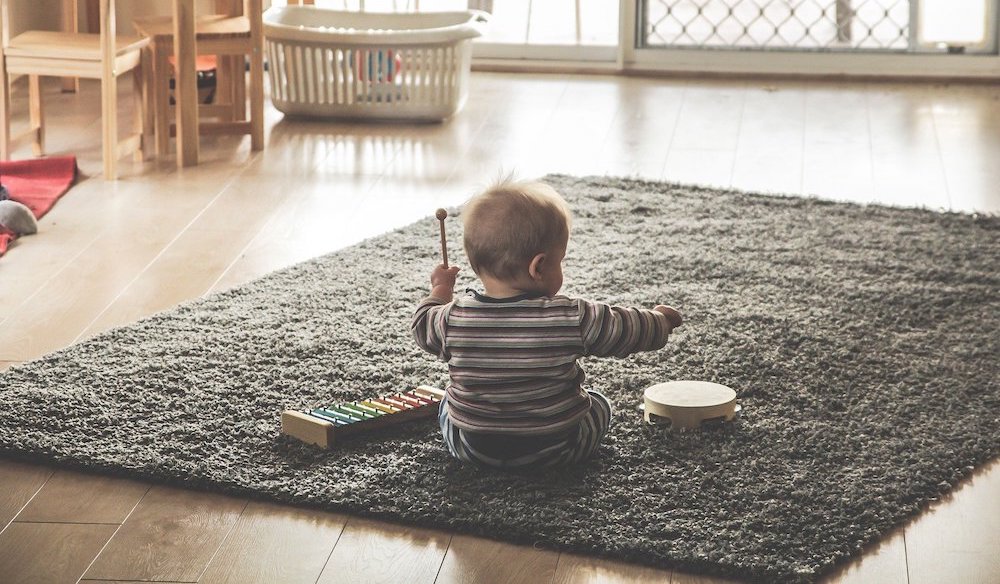How music-making benefits children
Published on Wednesday, 11 March 2020
Last updated on Monday, 09 March 2020

Music gets us moving, grooving and feeling good, and according to a recent study, home-based music-making activities are highly beneficial for young children’s brains – and perhaps even more beneficial than story time.
Here, we look at the study in more depth and see how parents can jazz up children’s development by sharing fun musical activities at home.
What did the study involve?
Although there has been plenty of research into the benefits of sharing books with young children, this study saw researchers examining early shared music activities at home, and later outcomes, for the first time.
The researchers wanted to see how informal home music education for toddlers affected their cognitive and social-emotional outcomes as preschoolers.
To do this, they analysed the data of 3,031 kids who took part in the Growing up in Australia longitudinal study, and compared the impact of music activities and book reading activities over time.
The researchers found that parent-child music activities have great benefits for youngsters – especially when the activities happen at home. And, more surprisingly, this study suggests that the benefits of these shared musical moments may actually outweigh the benefits of book-sharing in a child’s early years.
What are the key benefits of music-making for young children?
After analysing all that data, the researchers found that informal music-making at home, from the age of around two or three, can lead to better cognitive and social-emotional outcomes by the age of four or five.
Specifically, these parent-child music activities can lead to better:
- Literacy
- Numeracy
- Social skills
- Attention and emotion regulation by the time a child turns five
When comparing music sessions with story time, the researchers found that greater benefits stemmed from informal music activity than from book reading, particularly in relation to children’s positive social behaviour, attention regulation and, to a smaller, but still significant degree, numeracy skills.
We shouldn’t let this detract from the value of book reading, though. As well as identifying the benefits of shared musical experiences, one highlight of the University of Queensland study was that greater shared book reading at ages two to three is associated with a range of skills at ages four to five.
It’s also well established that reading to young children has numerous benefits. Specifically, story time can dramatically boost youngsters’ vocabulary, promote brain development and imagination, teach little ones about emotions and language, and help parents bond with their child.
How can parents and young children share informal music-making activities at home?
There is evidence that formal music lessons can improve a student’s IQ and many benefits associated with music education at school. However, when it comes to preschoolers, the University of Queensland study suggests that there is much to be gained from parents creating a playful musical experience at home – with a focus on sharing and informality.
Liam Viney is a Piano Performance Fellow at the University of Queensland and he says that, ‘the true power of musical play lies in the unique blend of creativity, sound and face-to-face interaction.’
He adds that, ‘the learning is strengthened by its basis in a positive, empathic, emotional relationship’ and there are there are lots of ways for parents and young children to bond and get in the groove at home.
Mr Viney encourages parents to recapture ‘a sense of play’ when sharing music-making at home and fun can be had:
- Making different voice sounds together
- Improvising a counting song to develop a child’s numeracy skills
- Making up rhymes to familiar tunes to encourage their literacy
- Finding DIY instruments to play, e.g. a saucepan ‘drum’ or wooden spoon ‘rhythm sticks’
- Having an impromptu jam session, e.g. using a toy piano and xylophone
- Making instruments with craft materials, e.g. a cardboard tube trumpet or spoon maracas
The takeaway from all this, is that whether a child goes on to be a violin virtuoso or a simple triangle-player, music-making activities are highly beneficial for their early development.
These moments provide a chance for parents and children to band together, have some fun and make some noise, so get set to play the day away!
Further reading
Related Articles

The role of sound play in early childhood services
Why sound is such an integral part of children's development and helps them communicate and learn.
